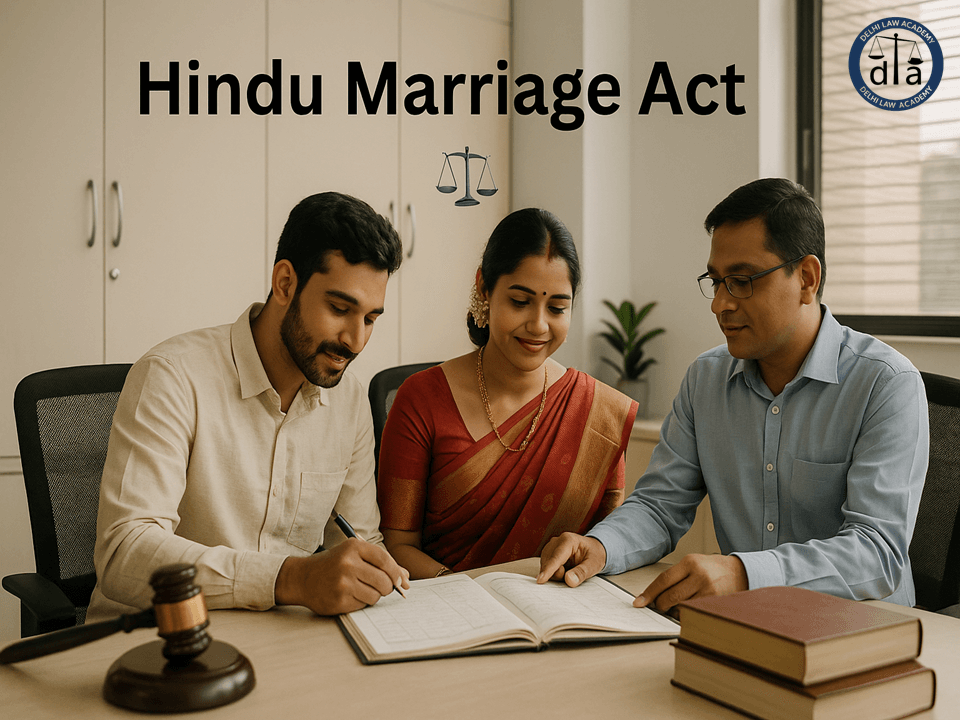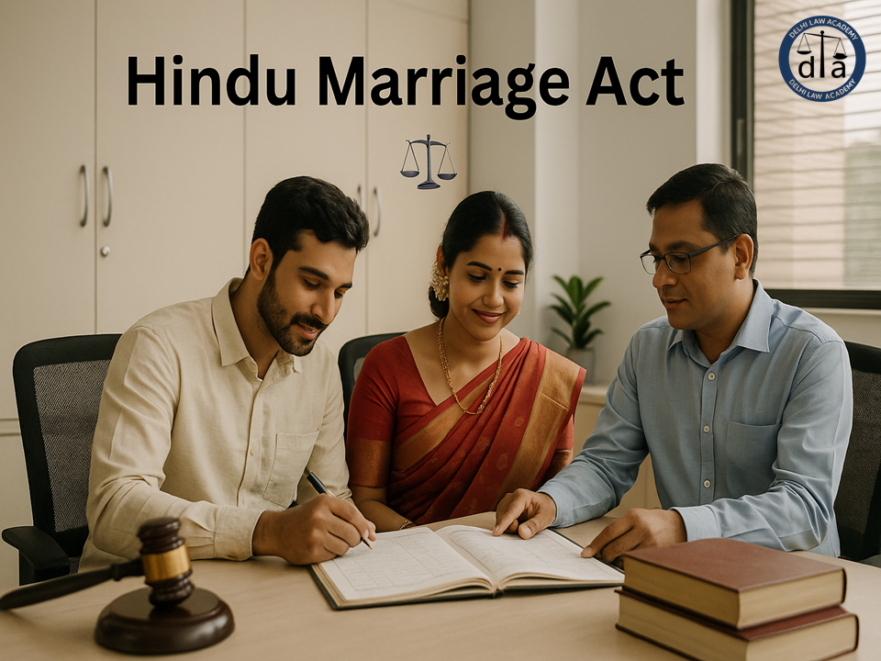
📘 Hindu Marriage Act Explained – Sections 11, 17 & 18
Preparation for RJS, DJS, PCS (J) and other Judicial Service exams
The Hindu Marriage Act is an important component of most Judicial Service exams in the country. Its thorough knowledge is a must for all aspirants of RJS, DJS, PCS (J) and other Judicial Service exams. To help such aspirants, Delhi Law Academy Jaipur has launched a series of study material modules on all important aspects of this important part of their syllabus:
📗 Hindu Marriage Act: Sections 11 & 17–18
TOPICS:
- Void Marriages
- Punishment of Bigamy
- Section 43 Special Marriage Act
- Section 44 Special Marriage Act
- Registration of Marriages in Other Forms
• Smt Seema v. Ashwani Kumar [SC 2006] • Sarla Mudgal v. Union of India [1995 SC] • Lily Thomas v. Union of India [2000 SC]
⚖️ Void Marriages – Section 11
• shall be null and void
• if it contravenes conditions (i), (iv) or (v) of section 5
Conditions (i), (iv), (v) of Section 5:
- (i) Neither party has a spouse living at the time of marriage.
- (iv) Parties are not within degrees of prohibited relationship unless custom or usage governing each of them permits such marriage.
- (v) Parties are not sapindas of each other unless custom or usage governing each of them permits such marriage.
Court may declare it null and void:
• by a decree of nullity
• on a petition by either party
🚫 Punishment of Bigamy – Section 17
Any marriage between two Hindus solemnized under this Act is void if at the date of marriage either party had a husband or wife living. Sections 494 and 495 of IPC shall apply accordingly.
📜 Section 494 IPC – Marrying again while husband or wife living
- Whoever, having a husband or wife living, marries again while such spouse is alive, commits an offence.
- Punishment: imprisonment up to 7 years and fine.
Exceptions:
- Marriage declared void by a competent court.
- Spouse absent for 7 years and not heard of as alive.
📜 Section 495 IPC – Concealment of former marriage
- Whoever conceals a prior marriage while contracting a new one.
- Punishment: imprisonment up to 10 years and fine.
• Sarla Mudgal v. Union of India [1995 SC] • Lily Thomas v. Union of India [2000 SC]
📘 Section 43 – Special Marriage Act
- Married person marrying again under this Act commits an offence under Section 494 or 495 IPC.
- The marriage so solemnized shall be void.
📘 Section 44 – Special Marriage Act
- Punishment of bigamy under Special Marriage Act.
- Contracting another marriage during the lifetime of a spouse invites penalties under Section 494 and 495 IPC.
- Such subsequent marriage shall be void.
📝 Section 15 – Registration of Marriages in Other Forms
- Any marriage celebrated otherwise than under this Act may be registered under this Chapter by a Marriage Officer if the following conditions are fulfilled:
- (a) A ceremony of marriage has been performed between the parties and they have been living together as husband and wife ever since.
- (b) Neither party has more than one spouse living at the time of registration.
- (c) Neither party is an idiot or lunatic at the time of registration.
- (d) Both parties have completed the age of twenty-one years.
- (e) Parties are not within prohibited relationships.
- (f) Parties have been residing within the district of the Marriage Officer for at least thirty days before registration.
⚖️ Punishment – Section 18
- Any person who procures marriage of himself or herself in contravention of Section 5(iii) shall be punishable:
- • with rigorous imprisonment up to 2 years, or
- • fine up to ₹1 lakh, or both.
Condition (iii) of Section 5:
Minimum age at the time of marriage:
• Bridegroom – 21 years
• Bride – 18 years
📚 Delhi Law Academy Jaipur – Your trusted source for Judiciary Preparation (RJS, DJS, PCS(J))
📚 Continue Your HMA Preparation
Don’t stop here! Strengthen your knowledge of HMA with our other blogs:
📘 Free Study Material for Judiciary Aspirants!
Download our FREE study material prepared by Delhi Law Academy’s expert faculty.
💬 Frequently Asked Questions on the Hindu Marriage Act, 1955
Contact us
📍 Delhi Law Academy – Jaipur Branch
6C, Tower 2, Coaching Hub, Pratap Nagar, Jaipur – 302033
📞 Phone:
+91 9911916552
+91 8447285606
✉️ Email:
contactus@delhilawacademy.com

